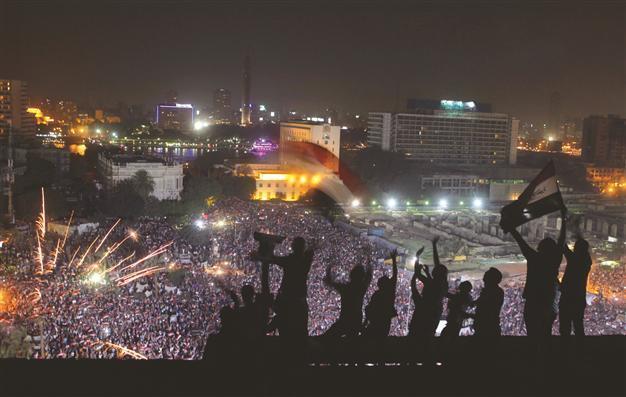Turkey losing positive perception in Middle East
ISTANBUL

The numbers may reflect the controversial positions taken by Turkey on a number of regional developments. AP photo
Positive perceptions about Turkey in the Middle East have decreased of late, with the sharpest drops registered in Egypt and Syria, according to a poll released yesterday by the Turkey Economic and Social Studies Foundation (TESEV). Despite this loss of popularity, Turkey is still seen as an important power in the region, with 60 percent of those polled supporting a greater regional role for Turkey, according to the study.
Conducted for the fifth time, the TESEV poll shows a considerable drop in Turkey’s popularity over the course of the last three years. While 78 percent of respondents had a positive view of Turkey in 2011, this ratio dropped to 69 percent in 2012, and to 59 percent in 2013.
The most recent poll was conducted in 16 regional countries between August and September via telephone interviews.
The sharpest drop was registered in both Egypt and Syria, where positive views of Turkey decreased by half. While the ratio of Egyptians with a positive view was 86 percent in 2011 and 84 percent in 2012, it had dropped to 38 percent this year. In Syria the percentages were 44 percent in 2011, 28 percent in 2012, and 22 percent in 2013.
The numbers likely reflect the repercussions of Turkey’s involvement in the developments of the two countries. While the Justice and Development Party (AKP) government has sided with the opposition calling for the Bashar al–Assad regime in Syria to quit, it has also staunchly criticized the recent coup in Egypt.
Some 88 percent of those polled in Syria believe the Turkish government is “not friendly” to their country, while this number is 68 percent in Egypt. However, 90 percent in Libya, 88 percent in Tunis, and 88 percent in Jordan believe the Turkish government is “very friendly” to their country.
Across the region, the United Arab Emirates ranks first in terms of positive perceptions, followed by Saudi Arabia, and then Turkey. Turkey had ranked first in 2011 and 2012.
Despite its erosion of popularity in the region, Turkey is still seen to be an important political power on equal footing with Saudi Arabia, with 64 percent saying that Turkey was becoming “more influential each day.” The ratio of those who see Turkey as a “model” is also still high in many countries, apart from Syria, Egypt, Iraq and Iran.
Fifty-five percent of respondents said Turkey presented a “successful combination of Islam and democracy,” though 76 percent said the law should take its legitimacy from religion.
38 percent think Turkey follows 'sectarian policies'In comparison to 2012, the perception that Turkey is following sectarian policies is increasing. Thirty-eight percent said Turkey was following sectarian policies, an increase of 9 percent from last year. In comparison, 65 percent said Iraq, 62 percent said Syria and 61 percent said Iran were following sectarian policies.
Regional interest in the Kurdish peace process in Turkey is lower than expected, with only 31 percent saying they are aware of developments. Some 85 percent of those who are aware of the process expressed support for it.
In contrast, there is more awareness in the region about the Gezi events, the widespread anti–government demonstrations sparked by a small group of environmentalists protesting against the destruction of a park in central Istanbul. Seventy-one percent followed the protests, with 50 percent expressing the opinion that they had a positive effect on the Turkish economy.
In 2012, economic problems had topped the list of most important issues in all 16 countries except Iraq. However, in 2013 political issues and security/terrorism issues topped the list, especially in Egypt, Lebanon and Tunis. The economy remained a concern for Iranians. In Iraq and Libya, the Western presence or threat is perceived as the number one issue of importance.
Meanwhile, 43 percent of respondents said the coup was good for Egypt, with 46 saying it was bad for Egypt. With regard to powers outside the region, there is an increase in positive perceptions about Russia and China.
Positive perceptions about the Arab Spring, however, are decreasing. Only 37 percent said the period had been good for their country - a ratio much lower than in 2011 and 2012. The exception was Iraq, where 58 percent believe the Arab Spring has had a positive impact on their country.
